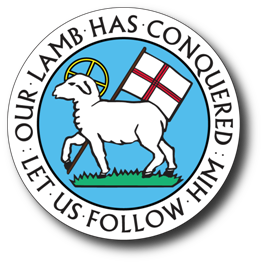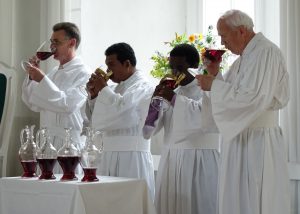“For over 500 years we Moravians have judged ourselves not by how beautiful our architecture is or how lovely our choirs sing or how eloquent our preachers are or how brilliant our theologians are. We have judged ourselves by how deep our faith is, how expansive our love is, and how life affirming our hope is.”
– Craig D. Atwood, Moravian Theologian
The Moravian Church is one of the oldest Protestant churches in the world. Fifty years before Martin  Luther nailed his 95 theses to a door in Wittenberg, our ancestors formed a Unity of the Brethren. We trace our roots back to John Hus who was burned at the stake for speaking out against the corruption and abuse of the church and state of his day.
Luther nailed his 95 theses to a door in Wittenberg, our ancestors formed a Unity of the Brethren. We trace our roots back to John Hus who was burned at the stake for speaking out against the corruption and abuse of the church and state of his day.
Our church began with a group of young men and women who formed a separate community in the wilderness of Moravia (now the Czech Republic) in Central Europe. This Ancient Unity, founded in 1457, dedicated themselves to living as closely as possible to the teachings of Jesus in the Sermon on the Mount. Despite often intense persecution, these brothers and sisters remained committed to their Unity.
According to the Ancient Unity, the New Testament tells us clearly what is essential: faith, love, and hope. Everything the church does should be for the purpose of building people up in faith, in love, and in hope. We have faith in what God has done and is doing; we love God, love ourselves, love our neighbors and love our enemies; and we face the future with hope because God is with us and we are with God now and forever.
A generation later, the Moravians further refined these “essentials“: First, the essential works of God are creation, redemption (salvation), and sanctification (or blessing). Second, the ways we respond to God’s work are faith, love, and hope. God’s work comes before our response, but the work of God and our response are both essential.
The Moravians of the Renewed Church in the eighteenth century talked about these essentials differently, though their life together still demonstrated the presence of God’s grace and their response. After the spiritual renewal of August 13, 1727, they emphasized their deep commitment to an individual, intimate relationship with Christ and their belief that this relationship is expressed in community. This profound experience of Christian community led our brothers and sisters to share the good news of Jesus Christ with those most marginalized throughout the world.
And so the wisdom of the Scriptures and the faithful example of the Ancient Unity and the Renewed Church provide a way to understand our Christian experience today. God creates; God redeems; God blesses. And we respond in faith, in love, and in hope. Everything else in the church should be grounded in these essentials: whether studying Scripture or baptizing babies; whether feeding the hungry or raising money for mission; whether serving our neighbors or caring for each other; whether profound sermons or quiet prayer; whether agreeing or disagreeing. We should be, individually and together, living the essentials!
Core Values
Moravians changed as the world changed, but through all the changes we can still perceive a number of core Moravian values. These values continue to influence who we are and how we relate to society.
Like all of the children of Abraham, we believe in the one God who created the heavens  and the earth and who calls all people to be stewards of the earth. For Moravians this means that we make every effort to clean up any messes we make in order to leave the next generation with a wholesome world. We also share the common vision of the children of Abraham that one day swords will be beaten into plowshares and God’s people will no longer learn to wage war. We believe in the Bible’s teaching that all people are created in the image of God and should be treated as images of God.
and the earth and who calls all people to be stewards of the earth. For Moravians this means that we make every effort to clean up any messes we make in order to leave the next generation with a wholesome world. We also share the common vision of the children of Abraham that one day swords will be beaten into plowshares and God’s people will no longer learn to wage war. We believe in the Bible’s teaching that all people are created in the image of God and should be treated as images of God.
We believe that God calls people to live by certain basic laws and to respect the rights of all people. To do this, Moravians believe that we should educate children to be people of good character. The famous Moravian bishop and educator, John Amos Comenius, taught that educating children without concern for developing their characters was like sharpening the knife of a madman. We try to teach integrity, honesty, self-control, peacefulness, and decency to our children. These have been cardinal virtues for Moravians for generations. In fact, we are one of the few churches that incorporates fundamental ethical principles in our statements of belief. We stress the need for people to be honest and fair in their business dealings; diligent and incorruptible in their public service; and faithful and true in their friendships. We strive to conserve these values.
As Christians, Moravians believe that Jesus Christ died not only for our sins but for the sins of the world, and we take that message of hope to others. We believe that the good news of Jesus Christ is a message of forgiveness and reconciliation rather than judgment and rejection of others. We believe that the best way to show our love for our Savior is by following Christ’s own commandments to love our brothers and sisters, to love our neighbors as ourselves, and even to love our enemies. We also believe in the Holy Spirit who comforts, guides, and nourishes us. We believe that the Holy Spirit brings joy, peace, and community. These are the spiritual gifts for which we pray and sing. These are our distinctly Christian convictions.
We try to take a spirit of reconciliation and gentleness into the world. It is not uncommon for Moravians to have friends in Africa, the Caribbean, and Europe because of our worldwide Unity. Today, there are far more dark-skinned Moravians than light-skinned Moravians. Whether African or European, Caribbean or American, we still call each other brother and sister and open our homes and hearts to one another.
 Indeed, Moravians try to preserve what is good. We have also quietly, persistently, and faithfully promoted the common good. It is important to remember that a time when the US Constitution declared that people of African descent did not have human and civil rights, Moravians in North Carolina were sharing the kiss of peace with black brothers and sisters. At a time when the US government ruled that native peoples could not be citizens and would have to relocate to reservations, Moravians were educating Cherokee brothers and sisters. At a time when it was illegal in many places in the US for women to speak publicly, Moravians allowed women to sit on their governing boards and hold important offices in the community. During many times of conflict and hatred in our country, Moravians raised a voice for peace and reminded the world of our shared humanity. And we have always shared our own food, money, and clothing with the poor. You will see Moravians today actively involved in organizations seeking ways to do good in the world.
Indeed, Moravians try to preserve what is good. We have also quietly, persistently, and faithfully promoted the common good. It is important to remember that a time when the US Constitution declared that people of African descent did not have human and civil rights, Moravians in North Carolina were sharing the kiss of peace with black brothers and sisters. At a time when the US government ruled that native peoples could not be citizens and would have to relocate to reservations, Moravians were educating Cherokee brothers and sisters. At a time when it was illegal in many places in the US for women to speak publicly, Moravians allowed women to sit on their governing boards and hold important offices in the community. During many times of conflict and hatred in our country, Moravians raised a voice for peace and reminded the world of our shared humanity. And we have always shared our own food, money, and clothing with the poor. You will see Moravians today actively involved in organizations seeking ways to do good in the world.
Community, tradition, stability, justice, and mercy. These are some of the traditional values that the Moravian Church tries to preserve and promote. We know that we are an unusual people and that we are often misunderstood, but we have borne witness to these values through the centuries.
For Moravians, Christianity is grounded in the living experience of faith in Christ, active love for others, and joyful hope. We believe that this living relationship with Christ is born and nurtured in local faith communities, in relationship with and in service to one another and the world.
Sources:
- Adapted from a speech by The Rev. Dr. Craig Atwood to the Downtown Rotary Club of Winston-Salem, Oct. 26, 2004
- More about Moravian History from the Moravian Church in America.
- Moravian Church History – Moravian Archives, Southern Province
- For more on our current ministries and programs – Commission on Congregational Development, Moravian Church, Southern Province